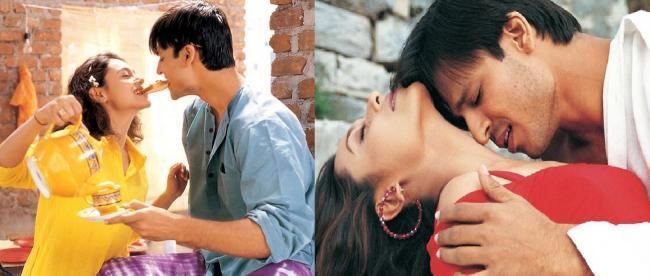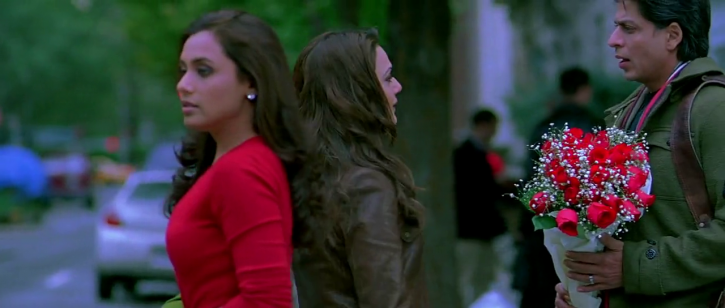By Rahul Desai
Marriage is a strange beast in mainstream Hindi cinema. By definition, its nature is at odds with the magnified language of the medium. Its constitutional legitimacy renders half of Bollywood’s pet storytelling templates unusable. Families have signaled their consent, there is nobody to fight but each other, and the underdog struggle to unite is over. The privatization of love is complete. It is no more an exciting startup idea; like a company gone public, either you succeed or you don’t.
This kind of distant serenity – some call it a “comfort zone,” others “intimate detachment” – is often too uneventful for our movies. For a diverse nation that invariably equates love with courage and romance with energy, the relatively stable concept of matrimony is hardly a worthy silver-screen saga.
Which is why perhaps the more successful “marriage” films rely on the youngness of the arrangement. The initial adjustment phase can still be dramatic, volatile and prone to excesses – all the emotional ingredients naturally suited to fit the newness of coupling. In both, Aziz Mirza’s Chalte Chalte, and Shaad Ali’s Saathiya, the conflicts of fresh partnerships are explored, but only after juxtaposing them against the heady “Before” chapter. To lend perspective to the ugliness of compromise and co-inhabitation feuds, we are first made to see them as single souls gravitating towards each other. The post-marriage turmoil is lent empathy by this pre-wedded bliss.

In the first half, they woo, sing songs, make grand gestures, defy parents and choose to design their own future. They remind us that we’re in a dark movie hall, looking for aspirational feelings. This way, the filmmakers trust us to understand that, despite their world going to hell in the second half, the two are still capable of being “heroes” and “heroines”. This way, we know what’s at stake, and what they must strive to regain.
What the makers don’t trust us with is the ability to digest harsh truths without being sold pretty truths. The fall, apparently, lacks depth if we don’t see the rise. The machinations of marriage alone aren’t considered substantial enough to hint at decay. In both cases, the fear of separation – Saathiya’s Aditya (Vivek Oberoi) almost loses Suhani (Rani Mukerji) to a hit-and-run accident, and Chalte Chalte’s Priya (Mukerji, again) threatens to leave India before Raj (Shah Rukh Khan) embarks upon the mandatory airport dash – results in dramatic course correction. Both resolutions are overly definitive, and intend to advertise a conclusion in a traditionally open-ended narrative. Discontent here is merely treated as an offshoot of desire. What such films unintentionally end up portraying, instead, is a deep-rooted cultural shortcoming. By shying away from the ambiguous consequences of incompatibility – by confining them within an orthodox three-act structure – our writers only further institutionalize the holier-than-thou mechanics of Indian marriage.
This is already a country with an entire generation that views bachelorhood and divorce as deficient character traits, and not choices. In this age, I find myself more inclined to believe that Raj and Priya stuck it out so that they wouldn’t be denied flats in housing societies; Suhani found middle ground with Aditya so that Western consulates wouldn’t deny her tourist visas for being a single woman. Their sanitized predicaments indirectly reinforce the brand of outdated thinking that suggests a domestic partnership needs to be endured, and can always be fixed.

This is why Karan Johar’s most ambitious film remains Kabhi Alvida Naa Kehna, in which a partial life tragedy assumes the contrivances of an against-all-odds romance. The solemnity of the subject itself should have totally disagreed with his trademark superfluity. Yet, he somehow scales up the tight-lipped gravitas of an extramarital affair, even as he operates within the skewed socioeconomic parameters of a fictitious NRI universe. In the process, though, he ends up eschewing the complexities of both marriages – in pursuit of achieving his filmography’s most obstinate “happily ever after”. There is a cautious defiance about this treatment, in that he flaunts the cinematic notion of “soulmates,” but not before equipping the erring protagonists with a self-flagellating conscience. They even spend years apart to compensate for their mistakes: sanskaari sinners, if you may.
In this context, Rakhee Sandilya’s Ribbon (2017), starring Kalki Koechlin and Sumeet Vyas, is perhaps the most significant film of our times. As an independent project unhindered by commercial restrictions, Ribbon comes the closest to dabbing the perspiration beneath the sexiness of a modern-day yuppie marriage. Marriage here feels like less of a formula, and more an idiomatic extension of shared identities. It embraces an informality that excludes sugarcoated dates and suhaag raats. We have two young characters that have been together for so long that they might be afraid of facing the world alone. Their love is essentially an arrangement to navigate the inflections of adulthood together.
Remarkably, Karan and Sahana’s relationship doesn’t unravel as a story; it unfurls as an unsentimental sequence of minor landmarks and invisible negotiations. The takes are long, and the conversations pointless – almost as if they were two accelerated grownups forced to inhabit a pragmatic Richard Linklater mindscape. They deal with all the cinematic unmentionables – bosses, housemaids, loans, salaries, groceries, schools, distance and babies. There is no real plot to speak of, no “before” and barely a flicker of an “after”. We don’t see them meet for the first time, and we don’t see them smile for the last time.
The film begins with an unplanned pregnancy and ends with a massive crisis. The turning point isn’t rose-tinted. This is the sort of nasty, no-holds-barred spat that usually occurs in the final third of conventional narratives, designed to heighten the relief that follows. Yet, Ribbon unleashes this moment two minutes before the end credits – with virtually no redemption in sight. It doesn’t subscribe to the philosophy that families are societal safe holds. That the movie ends in its immediate aftermath leaves us shaken; it suggests the kind of incomplete continuity in a marriage that most homegrown filmmakers have spent decades shielding us from. There are no apologies and cliffhangers, either – just two people who are a little less afraid of parenthood and a little more wary of couplehood.
We are conditioned to expect them to stay together for the sake of their little daughter. Yet, I’d like to believe that Karan and Sahana remain united on their own terms. And when they do split up – and they will, despite external pressure – it will be on their own terms, too. In a diverse nation that equates love with courage, there is nothing braver than the choice to forsake the security of love to retain a sense of individualism.






Leave A Comment
You must be logged in to post a comment.